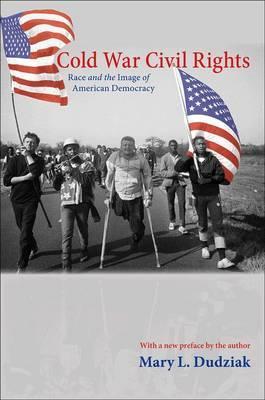Cold War Civil Rights

Cold War Civil Rights
This focus on image rather than substance--combined with constraints on McCarthy-era political activism and the triumph of law-and-order rhetoric--limited the nature and extent of progress. Archival information, much of it newly available, supports Dudziak's argument that civil rights was Cold War policy. But the story is also one of people: an African-American veteran of World War II lynched in Georgia; an attorney general flooded by civil rights petitions from abroad; the teenagers who desegregated Little Rock's Central High; African diplomats denied restaurant service; black artists living in Europe and supporting the civil rights movement from overseas; conservative politicians viewing desegregation as a communist plot; and civil rights leaders who saw their struggle eclipsed by Vietnam. Never before has any scholar so directly connected civil rights and the Cold War. Contributing mightily to our understanding of both, Dudziak advances--in clear and lively prose--a new wave of scholarship that corrects isolationist tendencies in American history by applying an international perspective to domestic affairs.
In her new preface, Dudziak discusses the way the Cold War figures into civil rights history, and details this book's origins, as one question about civil rights could not be answered wi
PRP: 272.80 Lei
Acesta este Prețul Recomandat de Producător. Prețul de vânzare al produsului este afișat mai jos.
245.52Lei
245.52Lei
272.80 LeiIndisponibil
Descrierea produsului
This focus on image rather than substance--combined with constraints on McCarthy-era political activism and the triumph of law-and-order rhetoric--limited the nature and extent of progress. Archival information, much of it newly available, supports Dudziak's argument that civil rights was Cold War policy. But the story is also one of people: an African-American veteran of World War II lynched in Georgia; an attorney general flooded by civil rights petitions from abroad; the teenagers who desegregated Little Rock's Central High; African diplomats denied restaurant service; black artists living in Europe and supporting the civil rights movement from overseas; conservative politicians viewing desegregation as a communist plot; and civil rights leaders who saw their struggle eclipsed by Vietnam. Never before has any scholar so directly connected civil rights and the Cold War. Contributing mightily to our understanding of both, Dudziak advances--in clear and lively prose--a new wave of scholarship that corrects isolationist tendencies in American history by applying an international perspective to domestic affairs.
In her new preface, Dudziak discusses the way the Cold War figures into civil rights history, and details this book's origins, as one question about civil rights could not be answered wi
Detaliile produsului











